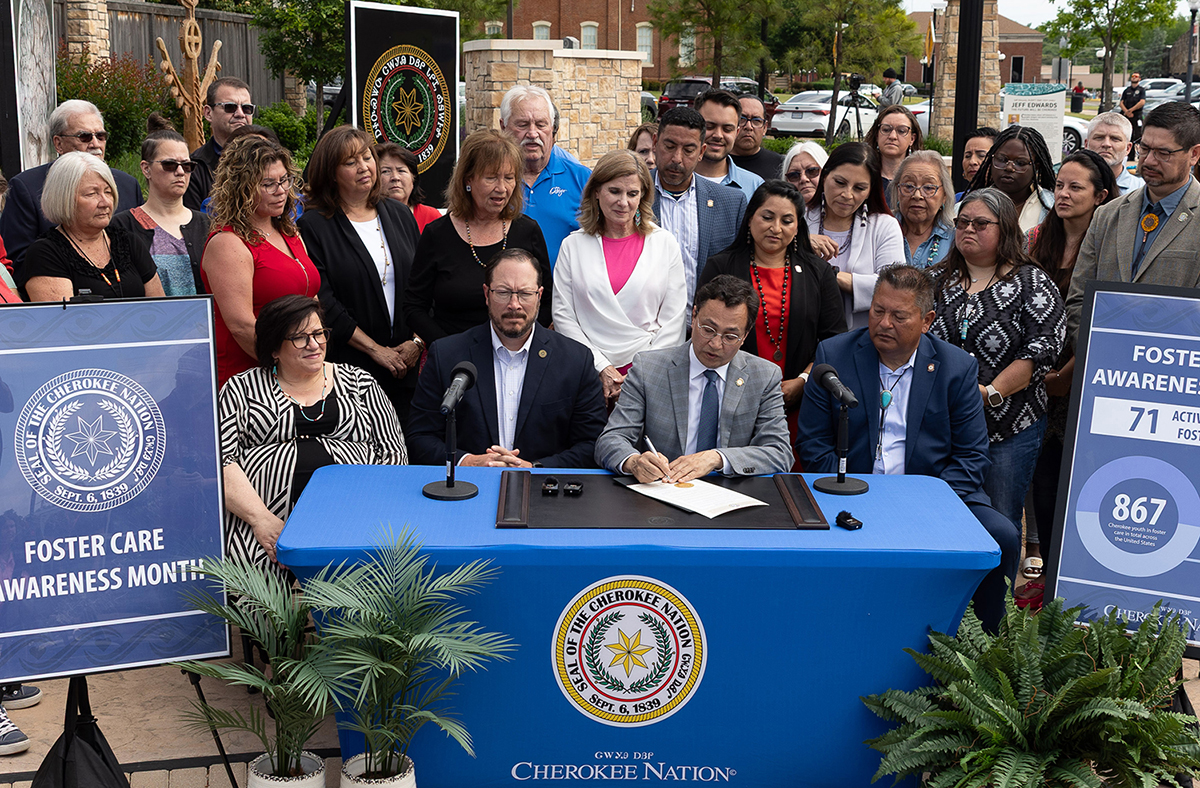
- Details
- By Chuck Hoskin Jr
Guest Opinion. May is Foster Care Awareness Month, a time when we at the Cherokee Nation reflect on one of the most profound responsibilities we carry as a community: caring for our children. This commitment is deeply rooted in our history and core values. We often say that children are the future, but I firmly believe they are also the measure of our present success. When we fail to protect and support our youngest and most vulnerable, we fail as a tribe. We cannot afford to do that.
Today, there are 876 Cherokee children in foster care across the United States, and 447 of those children live within the Cherokee Nation Reservation. These are young lives filled with hope and potential, and too many of them are navigating life without the stability and nurturing homelife that children deserve. It is our duty as Cherokees and as compassionate human beings to fill in that gap.
At Cherokee Nation, we are tackling the challenge head on. One way we’re doing that is through the Fostering HOPE program, which we initially launched in 2022 as a pilot program funded through our Respond, Recover, and Rebuild plan. When Cherokee youth turn 18 and age out of foster care, many face adulthood without the safety net of a family or community. It can be a time of uncertainty and danger. Fostering HOPE provides a $500 monthly stipend, alongside counseling and financial wellness education, as a bridge to make that transition less daunting. This support can continue until age 21, and for those pursuing higher education or training, it can extend further.

Fostering HOPE is not just about financial aid; it’s about saying to our young people, “You are not alone. We believe in your future.”
The success and continuity of this program reflect a broader truth that Deputy Chief Bryan Warner and I witness regularly: When we invest in Cherokees and walk alongside them through both trials and triumphs, we create a ripple effect that touches everyone. That’s why we’ve expanded paid leave for Cherokee Nation employees who foster or adopt children. It’s why we’ve placed remarkable leaders, like Sally Wilson, at the helm of our Indian Child Welfare department to ensure this work is grounded in experience, compassion and vision.
Unfortunately, the need for foster care support continues to outpace the number of families who can provide it. Today, we have only 71 active Cherokee foster homes in Oklahoma and Arkansas. That’s why I’m calling on Cherokee families to consider becoming foster parents. By opening your hearts and homes, you will not only transform the lives of children but also strengthen the fabric of who we are as a people. It’s a collective effort, in the spirit of Gadugi, and we all have a part to play.
Cherokee Nation First Lady January Hoskin has long been a passionate and vocal advocate for foster care and child welfare, reminding us to never lose sight of these precious children. Whether we’re creating new policies, building new space for our dedicated Indian Child Welfare staff, or raising awareness during Foster Care Awareness Month and throughout the year, we do not let up in our resolve to nurture hope and healing.
Together, we can make a difference for individual children and the Cherokee Nation as a whole. With each Cherokee child we uplift, we write a new chapter of success and goodness for our people. And as long as I serve as Principal Chief, this will remain one of my highest priorities. Their future is our future, and it is worth fighting for.
Chuck Hoskin, Jr. is the principal chief of the Cherokee Nation.
More Stories Like This
Superhuman. Should We Be Better Than We Are?Senator Ben Nighthorse Campbell Proved Representation Matters
The Lie We Keep Telling About Wounded Knee
Another Weapon of Mass Destruction
Colorado cannot heal until it confronts Sand Creek honestly
Help us defend tribal sovereignty.
At Native News Online, our mission is rooted in telling the stories that strengthen sovereignty and uplift Indigenous voices — not just at year’s end, but every single day.
Because of your generosity last year, we were able to keep our reporters on the ground in tribal communities, at national gatherings and in the halls of Congress — covering the issues that matter most to Indian Country: sovereignty, culture, education, health and economic opportunity.
That support sustained us through a tough year in 2025. Now, as we look to the year ahead, we need your help right now to ensure warrior journalism remains strong — reporting that defends tribal sovereignty, amplifies Native truth, and holds power accountable.
 The stakes couldn't be higher. Your support keeps Native voices heard, Native stories told and Native sovereignty defended.
The stakes couldn't be higher. Your support keeps Native voices heard, Native stories told and Native sovereignty defended.
Stand with Warrior Journalism today.
Levi Rickert (Potawatomi), Editor & Publisher

